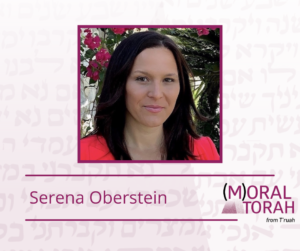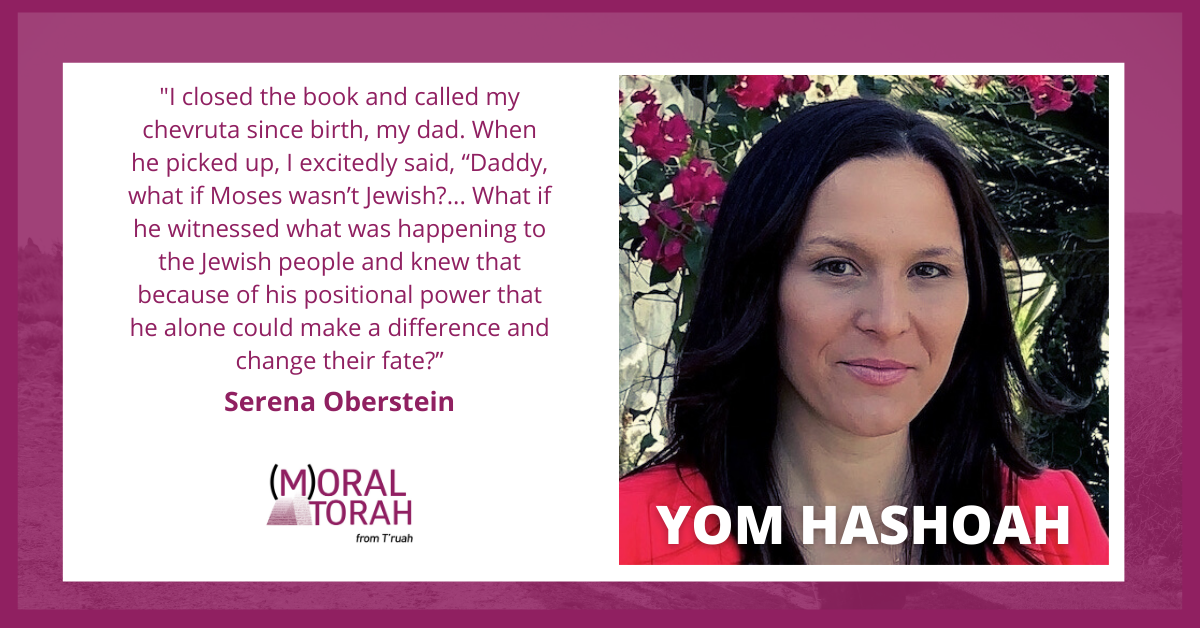A Special Guest D’var Torah by Serena Oberstein for Yom HaShoah
For as long as I can remember, my father would recount the story of Passover to me, reminding me that it was God that liberated the Jews from Egypt, not Moses or Pharaoh, so that as a people we would be forever indebted to God to fight for the liberation of every oppressed person. “And you shall tell your child on that day, saying, it is because of what the ETERNAL did for me when I went forth from Egypt.” (Exodus 13:8) He was adamant that I know this and that it should be a lesson that was at the forefront of our Passover seder every year.
I’ve just concluded my fourth Passover without him on this earth, and still it is his voice I hear in my head telling how my own grandfather, compelled to stand up against injustice, dropped out of 11th grade and lied about his age to join the army and fight the Nazis. My dad recounted to me the stories and the lasting effects that liberating Dachau had on his father, who witnessed the aftermath of years of systematic dehumanizing and genocidal brutality. In addition to the stories of mass graves and emaciated bodies that he wasn’t even sure were living, breathing people, it was the infrastructure that was particularly haunting: the train stations, the systems for cataloging how they annihilated us while trying to erase our culture and our people.
The horror stories we’re hearing about Uyghur people taken in the night, being separated from their families, having their heads shaved, put on trains, interned, forced into slave labor, and systematically murdered are all too familiar to the Jewish community.
Sign up to receive Moral Torah in your inbox each week.
The Uyghurs are an ethnic Muslim Turkic people in Xinjiang or East Turkestan, an autonomous region of China. Since 2017, China has detained more than two million Uyghurs in internment camps. Uyghur people have been tortured, sterilized, and murdered as part of an ongoing genocide.
What is happening to the Uyghurs is not the Holocaust, but make no mistake, we are witnessing China erect the same infrastructure that Germany developed leading up to the Berlin Olympics in 1936. The world had an opportunity then to send a message and possibly put an end to the plans of the Third Reich, but no one could imagine the death and destruction that were about to ensue. Instead they ignored the subtle hints of growing antisemitism, classification, and dehumanization of the Jewish people. Just two years later, Kristallnacht manifested the energized machinery of antisemitism that would spread across Europe and serve as a harbinger of the atrocities to come.
We know too well what happens when the world sits silent, but now we are all witnesses. We know that at least 90 multinational corporations are using Uyghur slave labor, at least four of them with ties to the Holocaust. We’ve heard the first-hand accounts of the mosque razing, IDs and passports being confiscated, the massive train infrastructure being built outside of concentration camps, and the families torn apart through systematic sterilization, forced marriages, reeducation, and much worse. Today we know where this leads, and today we need to do something.
Find more commentaries on Yom HaShoah.
Moses, for many, is held up by our tradition as the greatest Jewish hero and teacher, and this was true for me into early adulthood. When I was 23 and about to move to Washington, D.C. to spend the year in AVODAH, the Jewish Service Corps, I began digging into my hunger for Judaism, trying to understand what it meant to live my Jewish values in the world. I was reading The Particulars of Rapture by Torah scholar Aviva Zornberg. I had just read the third page of a chapter for what seemed like the 20th time when I came across a passage that hit me like a lightning bolt.
Moses later leaves that palace, and is able, strangely, to recognize in the brutalized slaves outside, his own brothers…Moses seeing is Moses allowing himself to be affected, to suffer with those who are unexpectedly called ‘his brothers.’
I closed the book and called my chevruta since birth, my dad. When he picked up, I excitedly said, “Daddy, what if Moses wasn’t Jewish?” Silence. Then he said, “He’s Jewish.” And I pushed back, “What if he wasn’t? What if he witnessed what was happening to the Jewish people and knew that because of his positional power that he alone could make a difference and change their fate?”
As my father emphasized over and over, God liberated us, not Moses, but it seems to me now that Moses’ willingness to look beyond himself — not to look away — was a key element in God’s orchestration of redemption. What if Moses hadn’t claimed us as his own? What if instead he stood silent as Pharaoh continued to enslave, work people to death, force our daughters to marry and procreate with Egyptians, and murder our sons at birth? The haggadah claims we would still have been slaves in Egypt to this very day, but I wonder if the Jewish people would be here at all?
 As we finish Passover, the celebration of a genocide averted, and commemorate Yom HaShoah, a day in which we remember the millions lost, we must be mindful not to repeat the mistakes of indifference. Let us embody the spirit of Moses and work towards the liberation of the Uyghur people so that “Never Again” is not just a phrase that we feel viscerally, but instead a promise and call to action.
As we finish Passover, the celebration of a genocide averted, and commemorate Yom HaShoah, a day in which we remember the millions lost, we must be mindful not to repeat the mistakes of indifference. Let us embody the spirit of Moses and work towards the liberation of the Uyghur people so that “Never Again” is not just a phrase that we feel viscerally, but instead a promise and call to action.
Serena Oberstein is the Executive Director of Jewish World Watch, a faith-based organization combatting genocide and mass atrocity, founded in 2004 as a response to the genocide in Darfur. She has a background in public service and the Jewish communal sector, having spent two decades creating solutions on the local, state, and federal level in the nonprofit and public sectors.


